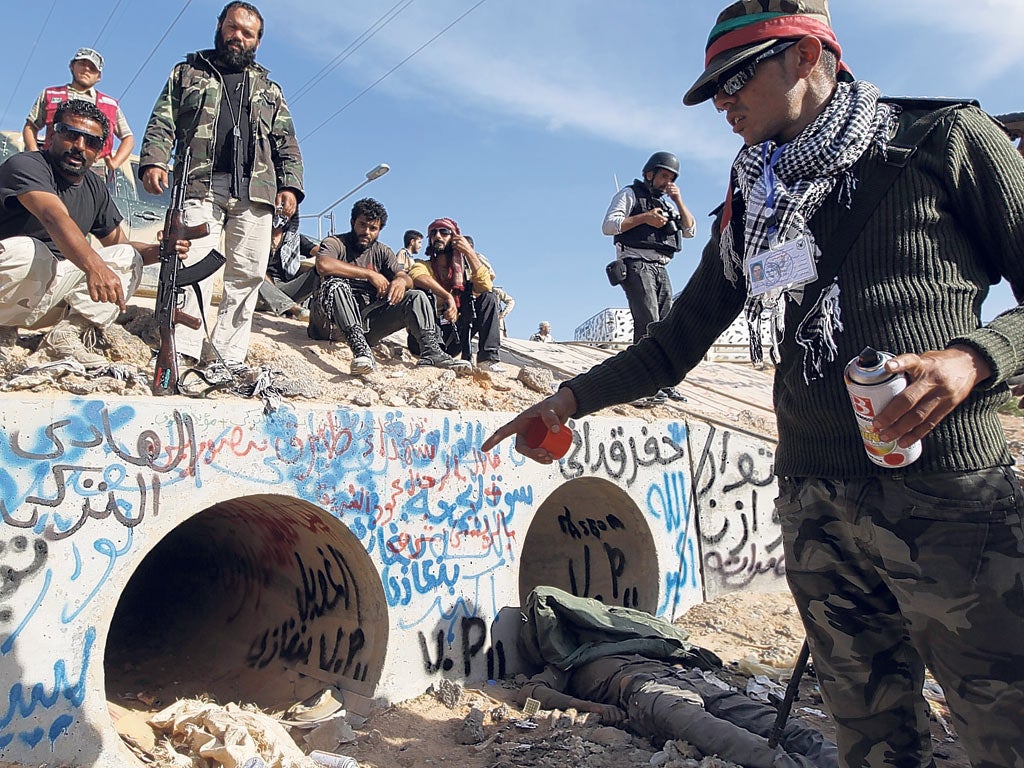The trail had run cold - but all roads led to the town of Gaddafi's birth

Rumoured repeatedly but never confirmed, Gaddafi's death was a long time coming – all the more strikingly so, given the $1.3m (£820,000) bounty that had been put on his head. True, the early assumption had been that he would be hiding out in the country which he had ruled by fear for 42 years; maybe in Sirte, but maybe also in Bani Walid, or maybe even much further to the south.
But as the hunt launched by the rebels and Nato forces failed to find any trace of his whereabouts, the speculation ranged further afield. Had he planned to join the convoy of former Libyan army vehicles that had passed into neighbouring Niger, perhaps on its way to Burkina Faso? An unnamed French military source, quoted by Reuters in early September, certainly thought it highly plausible, a view bolstered by Niger's ambassador to the UN in Geneva, who pointed out that surveillance over thousands of miles of desert was well-nigh impossible. "The desert zone is vast and the frontier is porous," he said, portentously.
"If a convoy of 200 to 250 vehicles went through, it is like a drop of water in an ocean." Could he be in Chad, from which he was widely reputed to have recruited mercenaries to join his battle against the "rats" of the rebellion against his 42-year rule? And could he perhaps, despite the denials that its government would provide him with a haven, have fled to Algeria, where his wife, daughter and a son had made a pre-emptory escape in August?
By September, it had been a commonplace, reinforced by the assertions by some in the Western-backed transitional council, that he was holed up in, or in the desert to the south of, Ghadamis, a town on Libya's borders with Algeria and Tunisia, eight hours drive west of Tripoli, where he was assumed to be under the protection of fierce Tuareg tribesmen in his pay. It was from there, after all, that he might be able to slip into Algeria if the rebel forces closed in; and it was there that the Libyan leading the hunt in the area, Colonel Moftah al-Swiah, a 38-year-old former detective, told The Sunday Telegraph: "We will examine every grain of sand in the search for him."
By now there were reports that British special forces personnel in 22 SAS regiment, said to have been fighting alongside Libyan rebel forces in the final stages of the revolution, had been ordered to switch their focus to what had become the mother of all manhunts. But until yesterday the trail had never really warmed up.
It seems in retrospect almost inevitable that he would return to his tribal home of Sirte, the coastal town he had lavished spending on in the hope of making it an international conference centre. To anyone visiting Sirte as long ago as March when it was under bombardment from Nato forces, as the ragged line between the rebel and pro-regime forces was sliding from west to east and back again, it was apparent this was one place in Libya where the support for Gaddafi among much of the population was genuine. Gaddafi had gone home.
Subscribe to Independent Premium to bookmark this article
Want to bookmark your favourite articles and stories to read or reference later? Start your Independent Premium subscription today.

Join our commenting forum
Join thought-provoking conversations, follow other Independent readers and see their replies